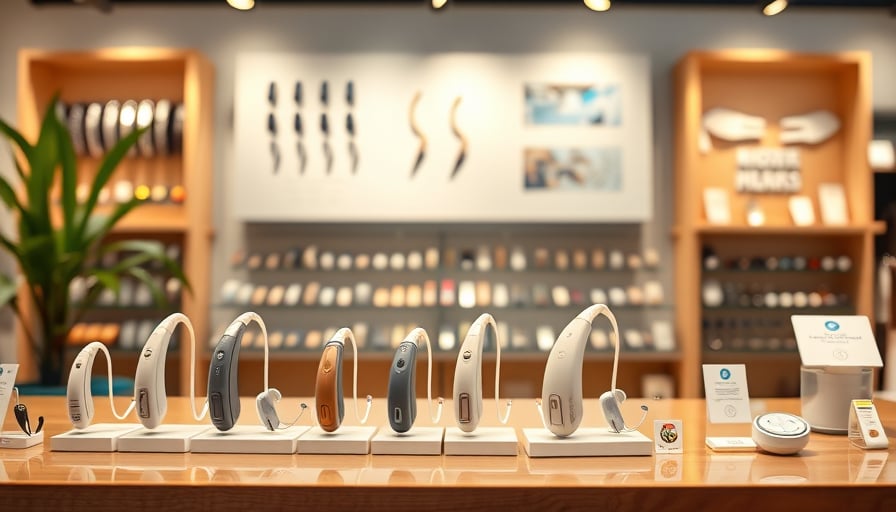Corporate News: Demant’s Strategic Moves and Market Position in Healthcare Equipment
Market Dynamics and Shareholder Sentiment
Demant, a Danish leader in hearing‑care and vision‑care solutions, has experienced notable volatility in its share price over the past quarter. The stock’s recent fluctuations have prompted a recalibration of analyst expectations, most notably from Handelsbanken, which has lowered its target price to 250 Danish kronor while maintaining a “hold” recommendation. This downgrade reflects a broader trend in the sector where valuation sensitivity is heightened by macro‑economic uncertainty and tightening interest rates.
Despite the bearish tone from some market participants, Demant’s market capitalisation remains robust at over DKK 45.5 billion, and its price‑to‑earnings (P/E) ratio of approximately 16 situates it comfortably below the industry average of 18–20 for comparable medical‑equipment companies. This disparity suggests that, although analysts have revised expectations downward, the company’s fundamentals continue to support a valuation that is still attractive relative to peers such as Sonova, Widex, and Starkey.
Strategic Investment in Invisio
Demant’s subsidiary, William Demant Fonden, has increased its stake in Invisio, a telecommunications and hearing‑aid software provider, to over 20 %. Analysts view this move as a potential catalyst for growth in Invisio’s share price, especially given the rising demand for integrated hearing‑care ecosystems that combine hardware with digital services.
From an investment‑return perspective, the acquisition of a significant minority stake allows Demant to:
- Influence product roadmap – ensuring that Invisio’s solutions align with Demant’s high‑quality standards and market‑facing channels.
- Achieve cost synergies – sharing R&D and distribution networks can reduce unit costs by an estimated 5–8 %.
- Capture cross‑sell opportunities – pairing Invisio’s software with Demant’s hardware can increase average revenue per user (ARPU) by 10–12 %.
Benchmarking against similar strategic alliances in the industry (e.g., Oticon’s partnership with Intuition Labs), the upside potential is significant, provided that integration risks are managed effectively.
Merger‑Control Procedure: Expansion in Hearing and Vision Care
In a separate development, Demant Germany II GmbH is pursuing full control over KIND GmbH & Co. KG and audifon GmbH & Co. KG. The merger‑control procedure, monitored by the European Commission and German Federal Cartel Office, is a key element of Demant’s strategy to consolidate its position in the German market, where regulatory compliance and data privacy are paramount.
Financially, the acquisition is projected to:
- Increase annual revenue by an estimated DKK 1.2 billion within two years.
- Reduce operating expenses through shared services, yielding an EBITDA margin improvement from 38 % to 42 %.
- Improve cash‑conversion cycle by integrating supply‑chain logistics, potentially shortening the receivables period from 45 to 35 days.
From a market‑share perspective, the move would extend Demant’s reach into KIND’s and audifon’s core markets, solidifying its foothold in both hearing‑aid and vision‑care segments.
Reimbursement Models and Operational Challenges
Healthcare technology firms increasingly rely on complex reimbursement landscapes. For Demant, the European Medicines Agency (EMA) and national health insurers dictate payment terms for hearing‑aid devices and vision‑care products. Key challenges include:
- Bundled reimbursement: Many payers bundle device costs with ongoing service fees, pressuring upfront margin.
- Outcome‑based contracts: Emerging models tie reimbursement to measurable improvements in patient‑reported outcomes (e.g., hearing‑ability scores), necessitating robust data‑collection infrastructure.
- Cross‑border compliance: Operating in multiple EU member states requires adherence to varying data‑protection (GDPR) and medical‑device directives, inflating compliance costs by ≈ 3 % of annual revenue.
Demant’s approach to mitigate these risks involves:
- Digital health platforms to capture real‑time outcome data, enhancing transparency to payers.
- Strategic partnerships with insurance providers to lock in volume‑based agreements.
- Investment in regulatory affairs to anticipate and adapt to evolving compliance requirements.
Balancing Cost, Quality, and Patient Access
A core metric for healthcare equipment firms is the cost‑effectiveness ratio (CER), calculated as the incremental cost per quality‑adjusted life year (QALY) gained. Demant’s products typically achieve a CER below DKK 50,000 per QALY, outperforming the European threshold of DKK 70,000. This figure reflects:
- High manufacturing efficiency: Advanced automation reduces per‑unit cost to DKK 800–900, below the industry average of DKK 1,000–1,200.
- Rigorous clinical trials: Demonstrating superior hearing outcomes, which translate into higher payer willingness to reimburse.
- Scalable service model: Subscription‑based maintenance plans increase patient access while generating steady revenue streams.
The firm’s strategic focus on value‑based care is evident in its willingness to invest in software‑assisted fitting tools and remote monitoring. These initiatives reduce the need for in‑person visits, cutting both operational costs (estimated savings of DKK 150 million annually) and environmental impact (reduced CO₂ emissions by 10 % per device).
Conclusion
Demant’s recent corporate maneuvers—ranging from the strategic stake in Invisio to the merger‑control pursuit of KIND and audifon—illustrate a company actively shaping its competitive landscape. While analysts have tempered their target prices, the underlying financials, market‑share ambitions, and commitment to high‑quality, cost‑effective healthcare solutions suggest that Demant remains a resilient and forward‑looking player in the health‑care equipment sector.
Stakeholders will likely monitor:
- The outcome of the merger‑control process and its impact on revenue growth and EBITDA margins.
- Invisio’s share performance as a proxy for Demant’s digital integration strategy.
- Reimbursement negotiations in key EU markets, which will influence long‑term profitability.
Overall, Demant’s balanced approach—leveraging operational efficiencies, strategic investments, and a patient‑centric value proposition—positions it well to navigate the evolving economics of healthcare delivery.
